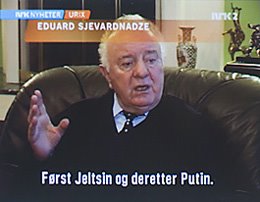Changing The Conception of Georgian Identity
 For us, growing up during the cold war, Georgia was in USA, and Russia was THE enemy. What we learned about the Soviet Union, or Russia, as most of us called it was that they had many rockets, a lot of spies, and big hairy women able to throw heavy objects longer than the rest of the worlds females. That was the image perceived from the television up to the eighties.
For us, growing up during the cold war, Georgia was in USA, and Russia was THE enemy. What we learned about the Soviet Union, or Russia, as most of us called it was that they had many rockets, a lot of spies, and big hairy women able to throw heavy objects longer than the rest of the worlds females. That was the image perceived from the television up to the eighties.Flawed political analysis from NUPI
Somehow the label “Russia” managed to stay alive after the collapse of the Soviet Union, describing all former republics. A container concept widely used by the vast majority of at least the Norwegian population. The fact that Russia “inherited” the UN position in the Security Council from the former Soviet Union established the concept further. The most worrying result of this is that you can see the remains of the Union rethorics also in political research in Norway. NUPI ( Norwegian Forreign Politics Institute) employ a lot of bright heads. Some of them unfortunately a bit biased or less enlightened about the Georgian Reality. In a Newspaper article last week two of them came up with an analysis of the situation between Russia and Georgia, giving the impression that Georgia was a rebellion state choosing a suicidal path in their foreign policy towards Russia. The impression left after reading the article was that Georgia should do what the Russians say, and act like a dependency. The scientists also managed to present some subjective critical comments towards the US – Georgian connection without commenting on the alternatives for Georgia. The passive EU for instance.
Georgia pictured as the “Enfant Terrible”
The article was without any reflections concerning Georgian status as an independent nation, Russian imperialism or Russian support to the breakaway regions. The article was flawed with misconceptions and lack of discussions around central issues debated in international media and the G8 meeting. The scientists might have asked the central question: “Why should Russia have ANY influence on Georgian territorial demands, wich has been acknowledged by the international community, and also Russia. They could have asked questions concerning Russians role as peacekeepers in the breakaway regions. But they didn’t. The whole article ended up as a defense for Russian politics, where Georgia was portrayed as the “enfant terrible”, led by a wild and unpredictable president, and Russia as the key to stability and development.
Misconceptions from a governmental institute is serious
The serious issue in this particular article is that NUPI is a governmental organization. What gives the Russian legitimacy in their ongoing campaign of destabilizing an other independent country’s government? One should at least expect this scientists to bare in mind the problems with the Russian lack of respect for treaties and other countries borders, like the problems in the Barents-sea, the blockade of Norwegian salmon, and the 101 Russian trawlers fishing illegally in the Norwegian sector in the Grey Zone in the Barents sea. They should bare in mind that the captain on a Russian trawler kidnapped Norwegian officials boarding the trawler to stop it’s illegal fishing. They should bare in mind that the crew on the trawler didn’t get punished in a Russian court, and that the Russians killed a Japanese fishing crew in an incident taking place in what they regarded Russian territory.
The Post Soviet reality doesn’t match the established pattern of thinking
The immediate conclusion, if we were to follow those scientists reasoning, is that the Norwegian government should give in for Russian demands in the northern territories in order to avoid a “suicidal” relationship with the Russians. As far as I understand there are no plans of “surrender”. So why should the strategy apply to Georgia? I think the reason is found in the concept of thinking about Russia as the Soviet Union with dependencies rather than Russia as ONE nation among other independent nations. The fact that Russia inherited the Soviet Unions votes in the UN Security Council might be yet another reason for the misconception . Therein lies the failure to implement post-soviet realities into to days research and analysis. And of course, in this case, also a badly hidden bias against Bush.
The Rhetoric; establishing an European identity.
A possible way to cope with this misconceptions could be to adjust the rhetoric to fit exactly a European way of communication. Not implementing the US way of cowboy-rethorics. Norway has a very close relationship with the US but never fall into the pit of using the American aggressive rhetoric that has alienated the US in it’s relationship with Europe. The EU-demand of toning down the rhetoric in the Georgia-Russia conflict might be a good advice. Not only to avoid extreme measures from Russia, but also to establish an European identity in order to avoid being alienated because of the close ties to USA. And second: To signal independence and diversity from Russia by using a more diplomatic rhetoric than Putin and the Russian Duma.

